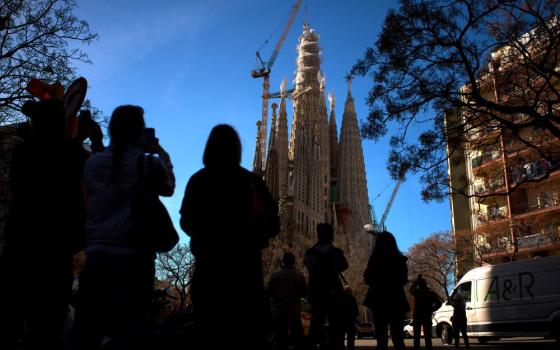Salesian Sr. Ana Cristina Chavira Sáenz, director of Comunidad Sagrada Familia (Holy Family Community), stands in the convent’s chapel in Monterrey, Mexico. With her are Sr. Inés Berrios Calderon, left, and Sr. Marie Pierrette. Holy Family Community helps migrant children maintain their studies while adapting to life in Mexico. (GSR photo/Nuri Vallbona)
Working in parks, public squares and community centers around Monterrey, Mexico, the Daughters of Mary Help of Christians — also known as the Salesian Sisters — have taught immigrant children and teenagers to read and write through games, storytelling and outdoor activities for the past four years. They also meet personally with the mothers to offer counseling and provide basic humanitarian aid, such as food and clothing.
"Our main goal is to serve migrant children who have never been able to study or who have had to suspend their studies," Sr. Ana Cristina Chavira Sáenz told Global Sisters Report.
Since its foundation in 2019, Chavira has been the director of the Comunidad Sagrada Familia, or “Holy Family Community,” an educational project created for migrant children and teenagers to regularize their basic studies in the greater Monterrey area. It is one of the most populated places in Mexico, with 5.3 million inhabitants, and is closest to the U.S. border, about 140 miles away.
Chavira is originally from Chihuahua, Mexico. She joined the Salesian Sisters in 1998 after volunteering for a year as a teacher's assistant at the Chinanteco Cultural and Agricultural Education Center for Indigenous people in Oaxaca, Mexico.
Following her congregation's charism, Chavira studied for a bachelor's degree in education between 2003 and 2007. In addition, she completed a specialization in spirituality at the Pontifical Faculty of Educational Sciences Auxilium in Rome in 2013. Chavira now serves as the vicar provincial of her congregation in northern Mexico. However, faced with ministering to migrants, she has also completed a specialization in international migration at the Colegio de la Frontera Norte.
"We want to be a sign of love for migrants," Chavira said. "We want them to know that someone loves them and doesn't want to exploit them but promote them."
Salesian Sr. Ana Cristina Chavira Sáenz, director of Comunidad Sagrada Familia (Holy Family Community), stands in the convent's chapel in Monterrey, Mexico. Holy Family Community helps children of immigrants maintain their studies while adapting to life in Mexico. (GSR photo/Nuri Vallbona)
Salesian Srs. Inés Berrios Calderón (from Nicaragua), Ángela Teresa Gutiérrez (a Cuban American) and Marie Pierrette Louijuste (a native of Haiti) also participated in the Comunidad Sagrada Familias project. They daily visit low-income places in the area to minister and provide support to migrants in their own neighborhoods.
"We move around different municipalities to attend to the migrants," Chavira said. "We work in the poorest areas because that is where the migrants are and where we meet Jesus."
According to Chavira, the sisters' national ties and multicultural backgrounds provide human and family connections with the migrants they serve, who came from countries that include Honduras, El Salvador, Nicaragua, Haiti, Cuba and Venezuela.
GSR: How did you start this project to care for migrant children and their families?
Chavira: This project came about after many studies among the Salesian provinces working in Central America, the Caribbean, Mexico, the U.S. and Canada. We were aware of the increasing migration between our countries and were working on each one in our own place, but in 2018, when the migrant caravans started, we decided to work together.
We wanted to respond to Pope Francis' call, and chose Monterrey because of the high number of migrants who arrive here to cross into the U.S.
Initially, we collaborated with another migrant shelter and with the U.N. Refugee Agency brigades, providing educational assistance to the minors and making the first contact with them.
Later, we took the initiative and launched our humanitarian aid campaigns. This is how we began to have a presence with migrant families outside of institutions and living in poor areas of Monterrey.
There we began to meet the families and work with the children educationally, with classes, games, food and clothing.
Salesian Srs. Inés Berrios Calderon, left, and Marie Pierrette organize items for immigrants at their motherhouse in Monterrey, Mexico, in May. The sisters help immigrant children maintain their studies while they adapt to life in their new country. (GSR photo/Nuri Vallbona)
Did your project pause with the pandemic?
The pandemic came a few months after we started the Comunidad Sagrada Familia project. It was a difficult season to carry out our mission; however, we found our place in parks, under the trees. We continue to do so to this day.
We did not have time to waste because many children had left home without ever going to school, so many did not know how to read or write. Unfortunately, neither did their parents because many think studying is a luxury.
Although our primary focus is on the children, we have been working with the fathers and, above all, with the mothers to help them have other life opportunities.
What are the main issues that you know about migrant families in Monterrey?
Each person and each family is different and unique. So we strive to help and educate and get to know them personally, as they come from very different places and we know that arriving in a new city takes work.
Because they are migrants and do not have a primary education, their labor field is minimal and exposes them to multiple abuses by employers.
Extreme poverty situations can lead to other problems such as delinquency, domestic violence and even prostitution. Working with families can prevent them from falling into street situations.
Advertisement
We are looking for people to flourish, so we address other needs, such as regularizing their immigration status by linking them with organizations that can support them legally. We also support them so that they can access some job training, and lately we are offering them psychological support. With the women, we dedicate special times to make them feel heard.
We are with the migrants as far as they allow because we want them not to feel alone, and we want them to be able to make their own way.
We want them to integrate positively into society because they have much to contribute.
What results have you obtained in all this time?
We do not seek to serve the masses but work with small groups to accompany them personally so that our work can bear fruit.
The main result is that the children are attending school, which was not a priority for their families. We help them catch up with their classmates and arrange with the government to study in public schools.
Another good thing is that the women participating in our groups are becoming aware of their personal dignity, learning how to raise their children more positively and focus on their personal goals.
Our work makes it possible for the migrants themselves to support each other, and when someone new arrives, they orient them by the experience they already know.
Salesian Sr. Ana Cristina Chavira Sáenz, director of Comunidad Sagrada Familia (Holy Family Community), from left, walks with Sr. Inés Berrios Calderon and Sr. Marie Pierrette along their convent's corridors in Monterrey, Mexico. Holy Family Community helps children of immigrants maintain their studies while adapting to life in Mexico. (GSR photo/Nuri Vallbona)
Why do you think the church should work with immigrants?
My own experience has taught me that every human being has value, regardless of origin or race. Each one has dreams to fulfill and a unique story. Working with immigrants is a great opportunity to get in touch with God himself.
We have to learn from the faith of migrants which, although sometimes nascent, has much to teach us because they trust in God without limits.
We must remember that Jesus inhabits our brothers and sisters, especially the poorest, the different and the excluded. Therefore, we must discover him and welcome him. In this way our faith grows.
What is your message to civil society and to governments?
I know that there has been an effort on the part of governments, who make laws and pronouncements in favor of human rights; however, they often remain just words.
Today, we need greater awareness on the part of officials at all levels, so that in reality, migrants are helped without extensive bureaucratic procedures and, at times, corruption.
To society groups and families, I can say that migrants are an opportunity to enrich our own culture and that we have to put aside the idea that they come to hurt us or steal our jobs.
Among the migrants, I have found people with good hearts, men and women searching for a better life with more opportunities.





